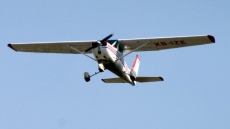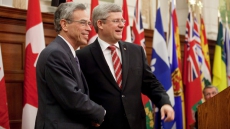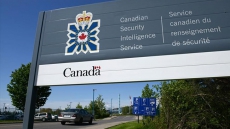AUCKLAND, New Zealand — Stephen Harper arrives in New Zealand today for an official visit with the country's prime minister that will include discussions on a touchy subject between the otherwise friendly leaders — Canada's heavily protected dairy sector.
Canada's so-called supply management system is a sore point in ongoing negotiations on the Trans-Pacific Partnership, a massive Asia-Pacific free-trade proposal between 12 countries with a combined population of almost 800 million.
The U.S. is pressuring Canada to cut tariffs on foreign dairy products as a TPP deal inches closer. Canada's dairy tariffs are among the highest of any TPP members.
New Zealand, the world's top dairy exporter, is also urging Canada to cut the tariffs as it seeks out new markets.
The Pacific Rim nation even objected three years ago to Canada's participation in the TPP talks unless it shuttered its supply management system.
"We have such a great relationship, and we work so closely together on almost any issue under the sun," Simon Tucker, New Zealand's high commissioner to Canada, said in a recent interview.
"In terms of issues where we have disagreements, it's just about the only one, so it has quite a profile ... it really is quite an obvious anomaly in our relationship."
Foreign dairy producers are slapped with tariffs that range between 200 and 300 per cent when they try to sell in Canada. Those tariffs not only make foreign cheese, butter and other dairy products prohibitively expensive for Canadian consumers, they also keep domestic prices for dairy products among the highest in the world.
Prime Minister Harper has said, nonetheless, that Canada is standing by its dairy producers in trade talks even though it recently committed to increased imports of European cheese in the trade deal with the European Union known as CETA.
"I've been out talking to a lot of dairy farmers and you do find a lot of them privately will talk about how change is necessary and inevitable," Tucker said.
Global demand is growing dramatically for dairy; Canada could benefit enormously if it levelled the playing field and stopped resisting change, he added.
"There's no reason given why Canada couldn't reorientate its dairy industry ... the danger is if you hang on and hang on and hang on and you get dramatic change foisted upon you, you may not be in a position to create what you want."
Harper meets with Prime Minister John Key on Friday.
Aside from trade, the two leaders are also expected to discuss Islamic militants in the Middle East, Russian aggression in eastern Europe, regional security and how New Zealand has forged a free-trade agreement with China.
Harper just wrapped up his third visit to China, where the two countries signed commercial and currency deals worth as much as $2.5 billion. But his government has lingering misgivings about building closer ties to China.
Both leaders will then travel to Australia to attend a G20 summit in Brisbane on Saturday.





